Throwing Stones VII: Mister Ed
(To read the previous chapter, click Throwing Stones VI: Hey, Hey, Heyday. )
In Part VI, the Rolling Stones struggled to become stars in America.
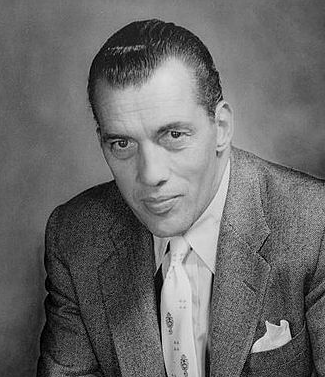 Ed Sullivan was the ultimate show business cipher. He couldn’t sing, dance, act or tell a joke. But he became one of the biggest stars, and the biggest star-maker, in television history.
Ed Sullivan was the ultimate show business cipher. He couldn’t sing, dance, act or tell a joke. But he became one of the biggest stars, and the biggest star-maker, in television history.
Born in New York in 1901, Sullivan boxed in his youth, and got his first big break as a sportswriter for The New York Evening Graphic. The Graphic was the quintessential tabloid; a paper so belligerent, sensationalist and exploitative that it was nicknamed “The Porno-Graphic.” The Graphic gave rise to Walter Winchell, the original showbiz gossip columnist. Winchell was a true phenomenon, and became a legendary kingmaker and career-breaker. The powerful columnist portrayed by Burt Lancaster in Sweet Smell of Success was modeled on Winchell. So was Ed Sullivan.
Young Ed was a quick study. When Winchell left the Graphic for the Hearst newspaper empire in 1929, Sullivan jumped at the chance to take over his column. Sullivan aped every career move his famous predecessor made. He landed a radio show, moved his column to another tabloid when The Graphic folded and eventually established himself as Winchell’s most determined rival. During the war years, Sullivan emceed a series of successful service fundraisers in Madison Square Garden. In 1948, the fledgling CBS Television Network hired Sullivan to host a variety show called Toast of the Town. It was an odd choice, to say the least.
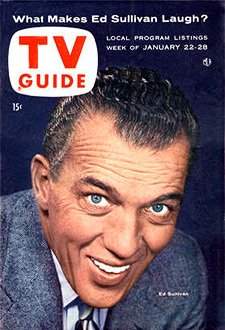 Nobody ever accused Ed Sullivan of being telegenic. Devoid of the easy charm and relaxed demeanor television demanded, Sullivan came across as tense and intense. His smiles registered as grimaces. His eyes darted beneath his furrowed brow. He was stiff-necked and often listed to one side, and his lurching movements convinced some viewers that he suffered from palsy. Sullivan’s patter was stilted, his banter was boring and his awkward phrasing and strange pronunciations delighted amateur impressionists everywhere. His program was the closest thing to vaudeville on TV, and he always promised “a rilly big shew.”
Nobody ever accused Ed Sullivan of being telegenic. Devoid of the easy charm and relaxed demeanor television demanded, Sullivan came across as tense and intense. His smiles registered as grimaces. His eyes darted beneath his furrowed brow. He was stiff-necked and often listed to one side, and his lurching movements convinced some viewers that he suffered from palsy. Sullivan’s patter was stilted, his banter was boring and his awkward phrasing and strange pronunciations delighted amateur impressionists everywhere. His program was the closest thing to vaudeville on TV, and he always promised “a rilly big shew.”
As far as the American public was concerned, Ed delivered. In 1955, Walter Winchell hosted a variety show on NBC. He bombed. Ed Sullivan had outdistanced his role model. He was a hit. Nobody could argue with Ed’s ratings. And even the harshest critics of his on-camera delivery had to admit that the man had a knack for spotting rising stars and breaking trends.
But in the early days of rock ’n’ roll, Ed Sullivan almost let the trend pass him by. Though he picked up the buzz on Elvis Presley early on, Sullivan refused to book the hot young singer. He felt the kid’s music and stage act were vulgar. And he said so. Elvis performed on The Dorsey Brothers’ Stage Show, The Milton Berle Show and The Steve Allen Show instead, causing a sensation.
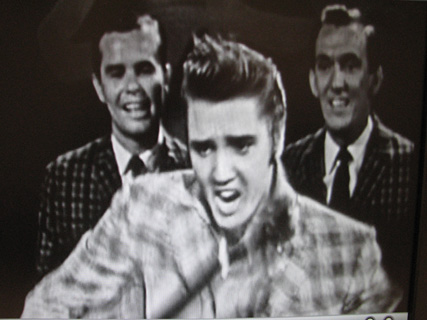 Steve Allen’s show aired opposite Sullivan’s, and demolished Ed’s ratings the night that Elvis appeared. Sullivan did a world class flip-flop, booking Presley for three shows. The first drew 60 million viewers, a TV audience record. By the third show, Sullivan was praising Elvis on air as “a real decent, fine boy” while CBS cameramen framed the hillbilly hip-shaker strictly from the waist up.
Steve Allen’s show aired opposite Sullivan’s, and demolished Ed’s ratings the night that Elvis appeared. Sullivan did a world class flip-flop, booking Presley for three shows. The first drew 60 million viewers, a TV audience record. By the third show, Sullivan was praising Elvis on air as “a real decent, fine boy” while CBS cameramen framed the hillbilly hip-shaker strictly from the waist up.
Though he lacked Walter Winchell’s viciousness, Ed Sullivan was no day at the beach. Sullivan liked show tunes and big band music. He saw his alliance with rock ’n’ roll as a necessary compromise, and he wasn’t particularly happy about it. Ten months before Elvis first appeared on his show, Sullivan had ordered Bo Diddley not to play his hit song, “Bo Diddley.” Sullivan thought “Bo Diddley” was nothing more than shameless self-promotion. It was an odd charge coming from a host who had demanded that Toast of the Town be rechristened The Ed Sullivan Show that same year, but insight is often in short supply.
Having heard Bo diddle around with Tennessee Ernie Ford’s “Sixteen Tons” in rehearsal, Sullivan ordered the young rocker to sing Ford’s tune on the broadcast. A baffled Bo agreed. But when the spotlight hit him on stage that night, “Bo Diddley” came out instead. Ed Sullivan was furious. He had showcased many African American acts over the years, despite political pressure to avoid booking them. His attitude toward young black performers was paternalistic, and he viewed Bo’s actions as a personal betrayal. Dismissing Bo as a double-crossing “boy,” Sullivan vowed to ruin Diddley’s career. He didn’t succeed, but he made sure Diddley was never seen on The Ed Sullivan Show again.
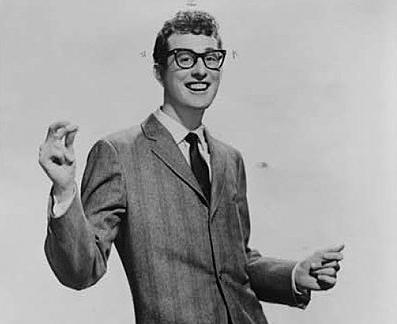 In January 1958, more than a year after Elvis’s final appearance, Sullivan ordered Buddy Holly not to play “Oh Boy.” Like Bo Diddley, Holly was appearing on the show to promote his current single, and was mystified by Sullivan’s last-minute meddling. Apparently, Sullivan had decided that the song was simply too energetic for his show’s audience. When Holly stood his ground, Sullivan cut his second song and ordered Holly’s electric guitar be turned down during “Oh Boy.” Holly rocked the house anyway. A flummoxed Sullivan later offered Holly more appearances. Avenging the slight to his Fender® Stratocaster®, Holly turned Sullivan down.
In January 1958, more than a year after Elvis’s final appearance, Sullivan ordered Buddy Holly not to play “Oh Boy.” Like Bo Diddley, Holly was appearing on the show to promote his current single, and was mystified by Sullivan’s last-minute meddling. Apparently, Sullivan had decided that the song was simply too energetic for his show’s audience. When Holly stood his ground, Sullivan cut his second song and ordered Holly’s electric guitar be turned down during “Oh Boy.” Holly rocked the house anyway. A flummoxed Sullivan later offered Holly more appearances. Avenging the slight to his Fender® Stratocaster®, Holly turned Sullivan down.
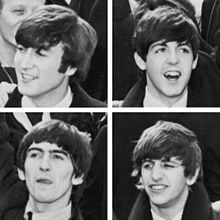
In 1963, Ed Sullivan was passing through London’s Heathrow Airport and witnessed the frenzy of British fans greeting The Beatles, who were returning from a TV appearance in Europe. Sensing an Elvis-style pop explosion in the making, Sullivan reached out to Brian Epstein, offering big money for a single appearance. Epstein responded with a clever counteroffer. He took less money for three appearances and a guarantee that The Beatles would receive star billing, opening and closing each show.
The Beatles first Sullivan appearance drew 73 million viewers, setting a new television audience record. It launched the British Invasion and forever changed the face of popular culture. Ed Sullivan and British rock were joined at the hip, whether Ed liked it or not.
(This concludes Part VII of Throwing Stones. Click now to read Part VIII: Band Vs. Brand!)
Bob G.
Great article. Enjoying the read on pop history!
George B.
I didn’t see Diddley that night. My folks said no Bo. Or Elvis! Saw Holly, who was way ahead of his time, and made doggone sure I saw all three of the Beatles performances–but I had to sneak out of the house to do it! I could hardly hear the music because of the screaming girls in the room and in the Sullivan studio audience. Ed was a show all by himself. Weird and wired with a fully-charged electric shock system pretty much describes his movements. Great history of Sullivan, his show and the way he ruled what the stars could or couldn’t do. Please stay the hell away from Hedda Hopper!
Larry M.
Great blog! Ed was the last great impresario, until the rise of Simon Cowell, who also couldn’t sing, dance, act or juggle.
Gary F.
Really enjoying this series. What a cast of characters!